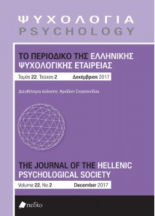Το νευροεπιστημονικό υπόβαθρο της ψυχοθεραπείας: μηχανισμοί και εγκεφαλικές δομές που επηρεάζονται από την ψυχοθεραπευτική διαδικασία

Περίληψη
Σήμερα υπάρχει μία γενικότερη τάση σύνθεσης των ψυχοθεραπευτικών μοντέλων καθώς και μία τάση διερεύνησης των επιδράσεων της ψυχοθεραπείας στον εγκέφαλο. Το άρθρο αυτό παρουσιάζει την ανασκόπηση ενός μεγάλου αριθμού ερευνητικών πηγών σχετικά με το νευροεπιστημονικό υπόβαθρο της ψυχοθεραπευτικής διαδικασίας. Η ανασκόπηση ενός τέτοιου ζητήματος, ξεκινά από ευρήματα της Αρχαιότητας έως και των τελευταίων δεκαετιών. Οι δημοσιευμένες ερευνητικές εργασίες που πραγματεύονται τις επιδράσεις της ψυχοθεραπείας στον εγκέφαλο παρουσιάζουν μελέτες, συνήθως με μεθόδους νευροαπεικόνισης, οι οποίες εξετάζουν τις νευρολογικές εκφάνσεις των πιο διαδεδομένων ψυχοθεραπευτικών μοντέλων καθώς και της φαρμακοθεραπείας. Όλοι οι ερευνητές καταλήγουν στο συμπέρασμα πως η ψυχοθεραπεία επηρεάζει τις εγκεφαλικές λειτουργίες, όπως νευροπλαστικότητα, μάθηση και μνήμη, νευρογένεση, διάθεση και συναίσθημα, οδηγώντας έτσι σε μία βελτίωση της ψυχικής υγείας. Η συζήτηση καταλήγει στην επίδειξη ενός νέου επιστημονικού κλάδου, της Νευροψυχοθεραπείας, η οποία είναι πολλά υποσχόμενη για την απελευθέρωση από τον κλοιό των ψυχιατρικών διαταραχών.
Λεπτομέρειες άρθρου
- Πώς να δημιουργήσετε Αναφορές
-
Σεληνιωτάκη Θ., & Νέστορος Ι. Ν. (2017). Το νευροεπιστημονικό υπόβαθρο της ψυχοθεραπείας: μηχανισμοί και εγκεφαλικές δομές που επηρεάζονται από την ψυχοθεραπευτική διαδικασία. Ψυχολογία: το περιοδικό της Ελληνικής Ψυχολογικής Εταιρείας, 22(2), 1–14. https://doi.org/10.12681/psy_hps.23251
- Τεύχος
- Τόμ. 22 Αρ. 2 (2017)
- Ενότητα
- ΑΝΑΣΚΟΠΗΣΕΙΣ

Αυτή η εργασία είναι αδειοδοτημένη υπό το Creative Commons Attribution-ShareAlike 4.0 International License.
Το περιοδικό ΨΥΧΟΛΟΓΙΑ έχει υιοθετήσει μία πολιτική Platinum open-access. Τα έξοδα υποβολής, επεξεργασίας ή δημοσίευσης των εργασιών καλύπτονται από την Ελληνική Ψυχολογική Εταιρεία. Τα πνευματικά δικαιώματα των δημοσιευμένων εργασιών προστατεύονται από την άδεια 'Creative Commons Attribution-ShareAlike 4.0 International'. Οι Συγγραφείς διατηρούν τα Πνευματικά Δικαιώματα και χορηγούν στο περιοδικό το δικαίωμα της πρώτης δημοσίευσης. Η άδεια αυτή επιτρέπει σε τρίτους, να χρησιμοποιούν την εργασία σε οποιαδήποτε μορφή, με την προϋπόθεση της διατήρησης των διατυπώσεων που προβλέπονται στην άδεια σχετικά με την αναφορά στον αρχικό δημιουργό και την αρχική δημοσίευση στο περιοδικό ΨΥΧΟΛΟΓΙΑ. Επιπλέον, κάθε διανομή της εργασίας οφείλει να γίνεται με τους ίδιους όρους διανομής, δηλαδή με την ίδια άδεια Creative Commons.


